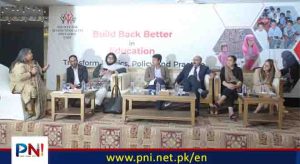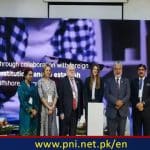Islamabad, November 10, 2023 With the highest number of out-of-school children in the world, Pakistan can no longer neglect the education emergency. On the occasion of the 14th Annual Convention held by the Pakistan Coalition for Education, an initiative of the Society for Access to Quality Education (SAQE), civil society organizations, youth groups and senior members of the academia came together to launch the “Charter of Education.”
“With an estimated 25 to 28 million children currently out of school in Pakistan, we, as a nation no longer have the luxury to treat education with indifference and neglect that consequent governments have meted out in the past,” said Zehra Arshad, the Executive Director of SAQE and the National Coordinator of PCE. “The political parties must come together to ensure a strong consensus on a common agenda for access to equitable education for all across Pakistan.
The “Charter of Education” developed under the slogan of “Vote for Safe Education,” urged the political parties to develop a joint Charter of Education at their ends on the same lines as they had developed the Charter of Democracy. Such a Charter should uphold the promise and enactment of Article 25-A and SDG-4 agenda for equitable education for all children. “The three key issues plaguing Pakistan’s education system right now include a colossally high number of out-of-school children, an underutilized youth bulge and alarmingly high learning poverty,” pointed out Dr. Muhammad Jehangir Khan, Associate Professor at PIDE.
The political parties should also provide tangible pledges in their manifestoes with short, medium and long-term plans to improve the access and quality of education, especially for traditionally marginalized groups such as girls, children with disabilities, ethnic and religious minorities and transgender students. “Owing to limited opportunities, bullying and harassment, the literacy rate among transgender people in Pakistan is merely 19%,” shared Nayab Ali, a transgender rights activist and the Executive Director of Transgender Rights Consultants Pakistan. Adding to this, Itefaq Khaliq Khan, Senior Program Manager at Sightsavers shared, “More than 90% of all children living with disabilities in Pakistan have no access to education.”
The participants also called for immediate measures to divert sufficient disaster aid towards education as well as providing conditional cash transfers to the affected households to facilitate the education of their children. “This will only be possible by enhancing public investment in education and mobilising the collective strength of multiple stakeholders to build back better,” said Rahat Rizwan, education Coordinator at IRC UK. Apart from the Ministry and Departments of Education, the other ministries, such as the Ministry of Climate Change should also be onboarded to create an education system that is truly shock resilient. Similarly, donors and other bilateral international actors must also join this effort to ensure that it is sufficiently supplemented through technical and financial support.
The Charter also demanded making educational institutes safe. “Existing laws should be implemented to protect students from all forms of harm, including sexual violence at the hands of their peers and those in positions of power in their institutes. Those found guilty should be strongly apprehended,” the Charter read.
Enhancing the delivery of education through teacher training programs, and the replacement of single-classroom, multi-grade schools with a one-teacher-one-classroom approach was also stressed in the “Charter of Education.” The Charter also demanded a revision of the curriculum to emphasize critical thinking, technical and vocational education and training (TVET) and 21st-century skills and to promote a culture of lifelong learning, non-violence, diversity and tolerance.
“Post-pandemic learning poverty stands at 75% in Pakistan,” shared Izzah Farrukh, Senior Education Specialist at the World Bank.
The importance of political and parliamentary oversight is paramount to ensuring swift progress against the country’s dismal education indicators. The Charter demanded the institutionalization of inclusive and regular platforms at the district, provincial and national levels for open dialogues between communities and civil-political administrations. Availability of data disaggregated by gender and disability status was also emphasized to support informed, data-driven decision-making. Speaking on the occasion, Muhammad Shahid Soroya, Director General, the Pakistan Institute of Education (PIE) shared “The government fully acknowledges the need to make reliable education-related data available. This is why, PIE has recently launched a publicly accessible data portal that will allow not just the government but also civil society organizations, donors and researchers to review Pakistan’s progress against all key education indicators including the status of out-of-school children.”
“For any of this to materialize, it is important that the government does not compromise on investment in education and at least 4 to 6 per cent of the GDP is diverted towards the education system,” said Zehra Arshad.









